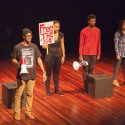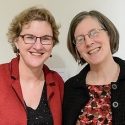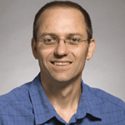New Wisconsin Idea grants venture into diverse territory
With topics ranging from nanotechnology to secondhand smoke and target audiences from at-risk children to cancer caregivers, a new round of “Wisconsin Idea” grants at the UW–Madison offer a fresh approach to serving state citizens.
Just under $500,000 in grants were allocated to eight projects through the 2006-2008 Ira and Ineva Reilly Baldwin Wisconsin Idea Endowment. The Baldwins generously funded the endowment in 2002 to provide a steady stream of support for projects that enhance Wisconsin’s people, culture and way of life.
“This endowment gives us an opportunity to share our knowledge and expertise and create partnerships with many different people around the state,” says Virginia Sapiro, interim provost. “The Baldwins believe that the strength of the university is its people and their connection to society. This program helps us build new relationships every year.”
The eight winners were chosen from more than 80 submitted proposals in 2005, a number that continues to grow with each funding cycle. “The large number of proposals indicates that our faculty, staff and students really care about becoming engaged and using their expertise to make a difference in the community,” Sapiro says.
Grant recipients in 2006 include:
Fields of Discovery: Wednesday Nite @ the Lab and Science Exploration Days.
This project, led by Biotechnology Center outreach manager Tom Zinnen, will present new avenues for the public to connect with the university’s science resources. “Wednesday Nite @ the Lab” will feature a different science discussions and hands-on activity on campus each week, while “Science Exploration Days” will take unique programs on the road to Wisconsin schools and communities.
Here at Home: A Wisconsin Cultural Tour for K-12 Teachers.
Ruth Olson of the Center for the Study of Upper Midwestern Cultures will lead this effort to create an eight-day summer bus tour that brings to life Wisconsin’s unique culture, including its geography, folk life, music, art and environmental resources. The bus trip will include teachers across many disciplines from the kindergarten to high school level, as well as experts and undergraduates from the university and state.
Nanotechnology Fellowships for Journalists, Policy Makers and Business People.
This project, led by engineering professor Wendy Krone and science editor Terry Devitt, will provide in-dept workshops on the scientific and public affairs implications of the burgeoning field of nanotechnology. The first year will provide fellowships for state and national reporters, while the second and third years offer training for policy makers and business people, respectively.
Caring for Cancer Caregivers: Empowering Caregivers to Help their Loved Ones and Themselves.
Lori DuBenske with the Comprehensive Cancer Center will lead this project to respond to the increasing trend of home-based cancer care and the health needs of caregivers. Often, these caregivers can be under-prepared for their new roles and face their own physical and psychological health risks. This program will provide training and continuing support to caregivers to help improve the quality of care and their own well-being.
Teachers Teaching Teachers (T3): A Professional Development Model.
Joan Ershler with the Waisman Center and Carol Keintz with the Dane County Parent Council will lead this project to enhance the classroom and social interaction skills of teachers with Dane County Head Start. State records indicate that only about half of all Head Start teachers have an early childhood degree, yet they work with a highly needy population. This project will pair Head Start teachers with educators from the Waisman Center’s early childhood program.
Women of the Scarred Earth Performance and Outreach Project.
Dance professor Peggy Choy and women’s studies chair Jane Collins will create dance and spoken word performances that deal with women’s survival strategies in a world scarred by war and environmental damage. UW–Madison students will be part of a touring company that will perform in a variety of locations around the state in fall 2006.
Better Health for Low-Income Children: Reducing the Asthma, Infections and Cancer Caused by Exposure to Tobacco Smoke.
Michael Fiore and Lezli Redmond with the Center for Tobacco Research and Intervention will develop programs aimed at helping the thousands of children from low-income families in Wisconsin whose parents smoke. Studies show children covered by Medicaid are 50 percent more likely than non-Medicaid covered children to have parents who smoke, and they face exponentially higher health risks due to that exposure. This program will focus intensively on helping parents break the tobacco habit.
Climate Change in the Lake Superior Region: An Exhibit and Community Education Project.
Dorothea Ledin with the Center for Biology Education and forest ecology professor David Mladenoff will work with scientists, artists and educators on a traveling art exhibit that helps illustrate some of the obvious and less visible impact of climate change on the Wisconsin northwoods landscape. Developers of the exhibit will hope to create ways that citizens can relate personally to climate change concerns, which include threats to native species and a reduction in biodiversity. The exhibit will be shared across northern Wisconsin and Michigan’s Upper Peninsula.
Tags: arts, biosciences, diversity



